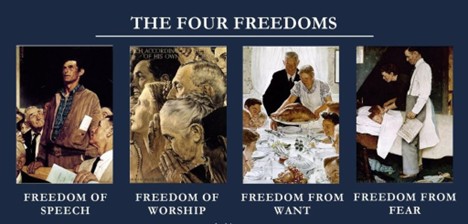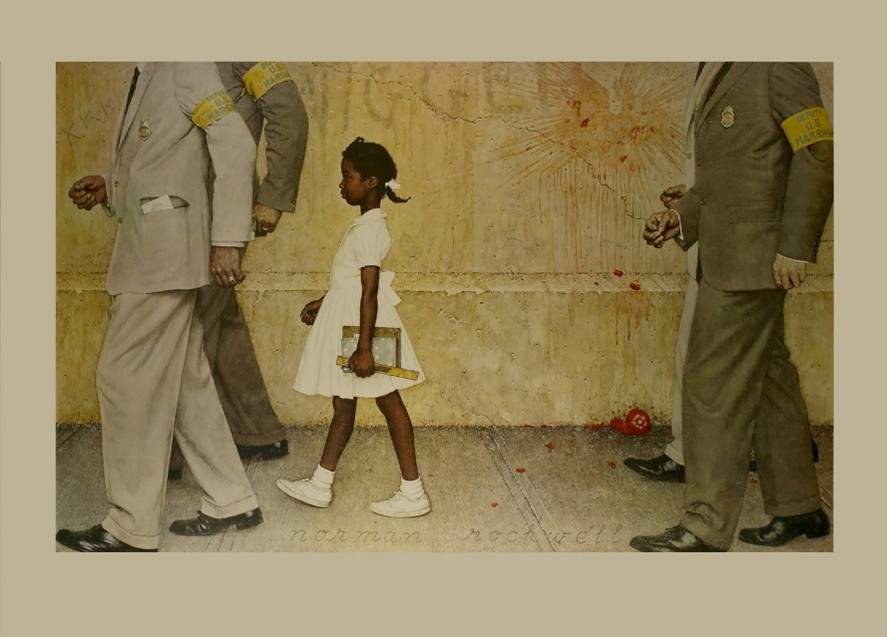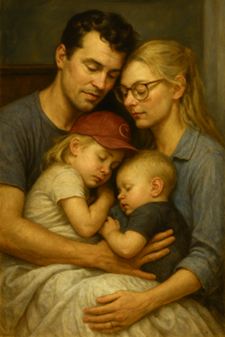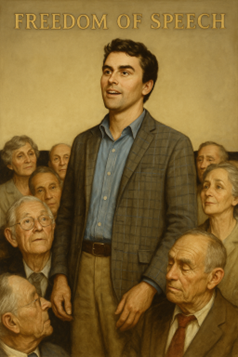On Wednesday, September 10, Charlie Kirk was assassinated. It was a turning point for the world. A young man was killed for his words and beliefs. Charlie was not a politician; he was a private citizen whose mission was to share his ideas, invite dialogue, and debate those who disagreed. He was a gatherer of people. Like Abraham, who pitched his tent open on all four sides to welcome strangers, Charlie created a space for conversation. Others found hate within debate; Charlie saw it as opportunity for collaborative curiosity. Others kept ideological opponents at a distance; Charlie welcomed them inside and in his signature style say, “Step to the front of the line if you disagree with me.”
For more than twenty five years, I have often visited Lenox, Massachusetts, and made regular pilgrimages to the Norman Rockwell Museum. Norman Rockwell was an iconic illustrator whose Saturday Evening Post covers entered living rooms across the country, sparking conversations about the pressing issues of the day. While Charlie carried a microphone to make his point, Norman Rockwell wielded a paintbrush.
I often brought my daughters to the museum, and together we would stand in the central gallery surrounded by Rockwell’s most famous works: the Four Freedoms. Each painting filled a wall., Each visit to the museum invited a new discussion. I can still recall the joy of hearing my children’s fresh insights as we studied Freedom of Speech, Freedom to Worship, Freedom from Fear, and Freedom from Want.

Charlie’s passing drew me back to those enduring canvases. Just as Rockwell painted with sincerity and vision, Charlie lived these Four Freedoms with equal devotion, embodying their ideals through his voice, actions, and life.
I would like to visit each of these paintings in memory of Charlie.
Charlie’s devotion to Freedom of Speech ended at the barrel of an assassin’s gun. He was killed while speaking freely to the college students who had become his flock. A radicalized young man filled with hate silenced him. The tragedy recalls Robert F. Kennedy, assassinated in 1968 by a Palestinian radical, even as he too advocated for Israel as a homeland for Jews, Christians, and Muslims. Both Charlie and RFK paid the ultimate price for their commitment to free speech and Israel.
As we turned to the right in the central gallery, we faced Rockwell’s prophetic Freedom to Worship. Yet just around the corner, another canvas came into view: The Problem We All Live With. In it, Rockwell depicted Ruby Bridges, a six-year-old Black girl, walking to school past rotten tomatoes staining the school wall and under the jeers of segregationists.

Ruby’s story is often remembered as a triumph of courage and innocence, yet the political reality was harsher. In 1960, when she integrated the William Frantz Elementary School in New Orleans, Louisiana’s Democratic governor, Jimmie Davis opposed desegregation. Like many Southern Democratic governors of the era, he resisted federal court orders enforcing Brown v. Board of Education. Ruby’s entry into school was not permitted by state leadership but compelled by federal authority, with U.S. marshals escorting her through hostile crowds. Across the South, other Democratic governors including Orval Faubus in Arkansas, Ross Barnett in Mississippi, George Wallace in Alabama, and Lester Maddox in Georgia fought bitterly to preserve segregation and divide Black and White students. Rockwell’s painting immortalized Ruby’s bravery and the cruelty she endured, reminding us that progress came not through local goodwill but through federal intervention against entrenched local resistance.
When I studied at Harvard, I was privileged to learn from Dr. Robert Coles, the psychiatrist who counseled Ruby during those tense days. He recalled that as U.S. marshals escorted her past angry crowds, Ruby sometimes paused, her lips silently speaking. When he later asked what she had been saying, she answered softly, “I was praying for them.” A child, facing hatred, offered not fear but forgiveness. That is the power of worship, to transform persecution into prayer.
After Charlie’s death, we witnessed something unusual. So often, tragedy is followed by riots, vandalism, and violence. But in this case, people gathered in vigils and prayer. His death broke our hearts but somehow unified our spirits.
The next painting in the central gallery as we turned further right was Freedom from Fear. How do we live without fear when a man can be shot for his opinion? I think of President Reagan after the 1981 assassination attempt. Lying on the operating table, he asked his surgeon, “Are you a Republican or a Democrat?” The surgeon replied, “Mr. President, today we are all Republicans.” In the wake of Charlie’s death, perhaps we can say: today, we are all Charlies.
Our final turn to the right put us in front of the last of the four paintings, Freedom from Want. Charlie’s generosity also lives on in stories of scholarships and travel grants for students to attend Turning Point USA. In this, Charlie embodied Rockwell’s Freedom from Want. Not in material wealth, but in spiritual and professional opportunity. His spark helped others kindle their own futures.
In the spirit of Charlie’s biblical pedagogical process, I looked to the Torah for some answers. However, the Torah offers no story of a leader who was assassinated. While there were threats of killing when Esau plotted against Jacob, reconciliation won. When Saul sought David’s life, but David cut only the corner of Saul’s robe, showing honor over vengeance.
I then looked to the biblical figure most like Charlie is Moses. Moses is forever speaking, teaching, rebuking, and inspiring the Israelites toward the Promised Land, yet himself never entering. Moses faced many challenges among the Children of Israel as he led them from slavery toward Eretz Yisrael / The Promised Land. In the wilderness there were determined dissents: the Golden Calf, the spies’ defection, and Korach’s rebellion. Yet Moses inspired the Children of Israel to remain united, overcoming these fractures by lifting up the voice of God and renewing faith in the Promise Land.
Harmony of Opposition
In our own day, Charlie faced rebellion and dissent each time he stepped onto a college campus. Yet, like Moses, he kept his tent of teaching open, inviting dialogue with his detractors. In doing so, he turned conflict into conversation and built blessed bridges where others only saw division. With staff and with microphone, in the desert and on college campuses, Moses and Charlie spoke hope into dissent and created community from conflict. Even Greek mythology points to this truth: Harmonia, daughter of Ares (god of war) and Aphrodite (goddess of love), embodied the union of opposites. From war and love came harmony. So too did Charlie, harmonizing love and conflict into dialogue, and turning the clash of ideas into a canopy of community.
What is God’s plan?
An eternal question is how can a man such as Charlie who was so committed to his faith in God in every way, be taken from our world so tragically at such a young age? In Erika Kirks’ own words, she said “God is Good. There is a reason for God’s Plan”
Perhaps this week’s Torah portion, Deuteronomy 26, offers a clue. Moses warns the Israelites of destruction if they abandon God’s commandments. He also commands them to bring their bikkurim, their first fruits, as offerings of gratitude upon entering the Promised Land. His words carry both rebuke and hope: a reminder of consequences and a vision of abundance when faith is honored.
Charlie’s life and death echo this message. Before his passing, he built a passionate community which has greatly expanded since his death. His message of faith, freedom, and courage has spread further still, while his haters have been unmasked by their own words and actions.
We live in a time when antisemitism and attacks on Israel have exploded. In the last 30 days, our nation’s moral core has been shaken—on August 29, 2025, in Minneapolis, six Catholic children were murdered while they prayed, with bullet casings engraved with hatred toward Jews, Israel, and Catholics. As Pastor Martin Niemöller warned after the Nazi regime: “First they came for the socialists … then they came for the Jews … then they came for me.” Hatred may begin with Jews but never ends there. Today hateful attacks have also targeted Christians, Ukrainians, Hindus, and others—reminding us that an assault on one faith is ultimately an assault on all.
John F. Kennedy, in his Inaugural Address on January 20, 1961, famously said: “Ask not what your country can do for you. Ask what you can do for your country.” In that moment, JFK inspired a generation to dream boldly, to act selflessly, and to build a better world together.
Just days before Charlie’s death, a young Ukrainian woman, Iryna Pushka, was stabbed to death on a Charlotte, North Carolina train while passengers looked away in chilling callousness. It was the horrific opposite of the call to community. Instead of service, there was silence. Instead of courage, there was complicity. The moral turpitude of those passive passengers raises the searing question: how can a society become so barren of compassion that not one person intervened? Despite explicit video evidence of Iryna’s murder and of the passengers’ complicit complacency, the muted response from much of the media and the indifference of some public leaders revealed an even deeper wound: apathy layered upon atrocity.
That same multi-headed monster of hate, apathy, and grieving has resurfaced beside Charlie’s assassination. Inexplicably, there are many that have celebrated Charlie’s murder which feels like Sodom and Gomorrah revived.
JFK himself was assassinated, and with him a piece of America’s moral vision was wounded. His ideals of courage, service, and sacrifice now seem tarnished in the mirror of our current moral decay. The challenge before us is whether we can recover that spirit and reclaim a society worthy of compassion, courage, and community.
Why was Charlie assassinated?
What if God needed Charlie to help amplify his message, just as Moses did in Deuteronomy? Reminding a “mixed multitude” that faith and gratitude are the keys to entering the Promised Land. Perhaps Charlie’s message needed to shine down from heaven rather than remain bound to earth. In Exodus, manna rained from heaven on the first Shabbat, God’s sustenance for his children. Charlie, too, fervently honored the Jewish Shabbat each week, living in rhythm with that eternal gift.
As we mourn Charlie Kirk’s death, the Jewish prayer of the Mourner’s Kaddish offers us a guide. Each week, Jewish mourners recite this ancient prayer. Two elements stand out as guideposts for us today.
First, the prayer itself never mentions death. Instead, it magnifies God’s name, affirming life and hope in the face of loss. Tradition holds that the earliest form of this prayer was offered after the passing of a great teacher whose words were deeply missed. Two lines capture its essence: “May His great name be blessed forever and to all eternity,” and “May there be abundant peace from heaven, and life, for us and for all Israel” These words remind us that even in grief we can choose to make a name into a blessing and to seek peace beyond ourselves.
Second, the Mourner’s Kaddish is never said alone. Jewish law requires a community of at least nine others to surround the mourner, to share the burden of grief, and to amplify the prayer. So too may we, in mourning Charlie, continue to unite as a community, to carry one another in sorrow, and to bring peace into our fractured world.
In Erika Kirk’s words,
“I will never, ever have the words to describe the loss that I feel in my heart … Charlie … I know you do too. … Our world is filled with evil. But our God … is so good. So incredibly good. … And we know that for those who love God, all things work together for good…” Charlie, baby. Charlie … I promise I will never let your legacy die … Rest in the arms of our Lord … ‘Well done, my good and faithful servant.

Charlie asked “to be remembered for courage for my faith … the most important thing is my faith.”
As Maimonides wrote in Mishneh Torah, Bikkurim, Chapter 4, after offering the first-ripened fruits (bikkurim), one must also bring a peace offering and recite song, raising the fruits in all four directions as a sign of gratitude to God, before remaining in Jerusalem overnight. This ancient ritual of fruit, peace, song, and four directions mirrors Rockwell’s Four Freedoms. Just as the pilgrim turned in every direction to proclaim thankfulness, so too we now turn to Charlie’s legacy: freedom of speech, freedom to worship, freedom from fear, and freedom from want. With each direction, we offer gratitude, and with each prayer we trust that Charlie rests in Jerusalem—the eternal city of peace—and in the heavens, embraced by divine abundance.
As Charlie would remind us: faith first, family always, life is sacred, and work as service; this is how we count our blessings, and how we can live with purpose.
And if we do, then step by step, soul by soul, … together, as a mixed multitude,…we will enter the Promised Land.
Epilogue
In what became his final public words, Charlie Kirk was asked to share a favorite passage. He responded simply: “This too shall pass.” Hours later, he was gone. Yet those words, rooted in Jewish wisdom (Gam Zeh Ya’avor), carry an enduring lesson. Seasons of trial are not eternal; grief itself will one day give way to healing. Charlie’s life and his message now live beyond the tragedy of his death, reminding us that despair will pass, but faith, courage, and community remain. As he once said, “I want to be remembered for courage and for my faith. The most important thing in my life is my faith.” May we carry that charge forward, remembering not only that pain passes, but that purpose persists.
You can read more about Kirk’s last word here and more about Gam Zeh Ya’avor here.
Further Reading
You can read more about finding harmony in opposition here.
You can read about how we can overcome spiritual schisms here.
You can read more about grasping how tragedies can befall good people here.
You can read about how the tragic death of the Bibas boys became a powerful call for community here.
You can read more about the promised land here.
Appendix: Torah References
Abraham’s Open Tent
- Genesis 18:1–8 – Abraham sits at his tent’s entrance, welcoming three strangers, offering food and hospitality. This passage is the source for the teaching that Abraham’s tent was open on all four sides.
Esau and Jacob
- Genesis 27:41 – Esau plans to kill Jacob after the blessing.
- Genesis 33:4 – Instead of killing him, Esau embraces Jacob, symbolizing reconciliation.
David and Saul’s Robe
- 1 Samuel 24:11 – David spares Saul’s life in the cave, cutting only the corner of his robe to show honor over vengeance.
The Golden Calf
- Exodus 32:1–35 – While Moses is on Sinai, the people demand a calf of gold; Moses intercedes after God’s anger.
The Spies’ Defection
- Numbers 13:1–33; 14:1–45 – Twelve spies are sent to scout the land. Ten spread fear, while Caleb and Joshua urge faith and courage. The people rebel.
Korach’s Rebellion
- Numbers 16:1–35 – Korach and his followers challenge Moses and Aaron’s leadership; the earth swallows the rebels.
Bikkurim – First Fruits
- Deuteronomy 26:1–11 – Instruction to bring the first fruits of the land to the Temple as an offering of gratitude to God.
Blessings and Curses
- Deuteronomy 28:1–68 – Moses lists the blessings if Israel obeys, and the curses if they disobey God’s commandments.
The Mixed Multitude
- Exodus 12:38 – When Israel left Egypt, a “mixed multitude” went with them, symbolizing diverse peoples joining in the journey.
Manna and the First Shabbat
- Exodus 16:22–30 – Manna falls from heaven with double portions on the sixth day, teaching Israel to rest on the seventh, the first Shabbat.
Norman Rockwell Museum
Located in Stockbridge, Massachusetts, the Norman Rockwell Museum houses the world’s largest collection of original Rockwell artwork. Its galleries showcase not only Rockwell’s iconic Four Freedoms and Saturday Evening Post covers, but also later works grappling with social justice themes. A pilgrimage for anyone seeking to understand the visual roots of American ideals, the Museum offers rotating exhibits, educational programs, and deeply moving art that invites reflection and dialogue.






